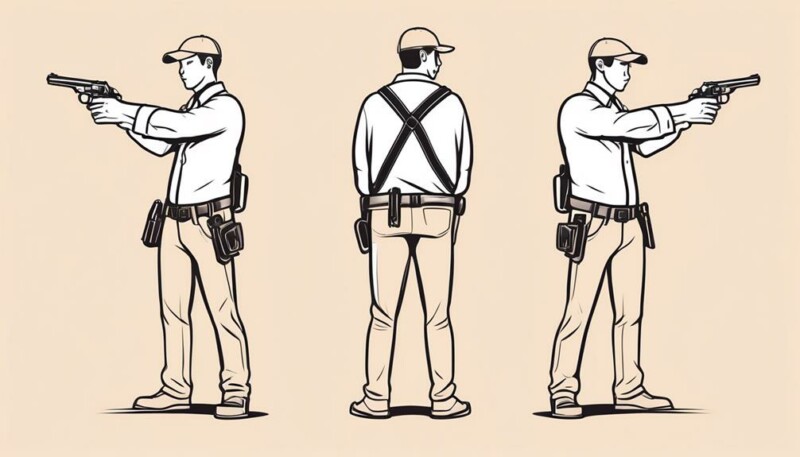Imagine the weight of a firearm, tucked discreetly beneath your jacket, its cool metal a silent promise of protection.
As a novice looking to exercise your rights to concealed carry, you must understand the laws that govern this responsibility. They're not one-size-fits-all and can vary dramatically from state to state.
From eligibility criteria to carry permits, from private property rules to restrictions in educational institutions, the panorama of regulations is broad and intricate.
You'll also need to consider the differences between open carry and concealed carry laws, the right equipment for safe carry, and the implications of travelling with a concealed weapon.
There's a lot to unpack here, so let's start peeling back the layers.
Key Takeaways
- Familiarize yourself with the specific concealed carry laws in your state.
- Complete a certified concealed carry training course.
- Choose a firearm suitable for concealed carry, considering factors like size, weight, and caliber.
- Understand the legal use of force and self-defense laws in your state.
Eligibility for Concealed Carry

Understanding your eligibility for concealed carry hinges on several factors, including age restrictions, prior felony convictions, and specific state laws, such as those outlined in the Texas Penal Code. If you're considering obtaining a concealed handgun license, it's critical to understand these regulations.
In the past, you needed a license to carry a handgun in Texas. However, recent changes effective from September 1, 2021, removed this requirement. Yet, it's not a free-for-all. Certain individuals may be barred from owning or possessing a firearm due to misdemeanors or protective orders.
Federal law also plays a role in your eligibility for concealed carry. It imposes restrictions on firearm possession, which can affect your ability to obtain a concealed carry license. Therefore, it's essential to check your background thoroughly, ensuring you meet all requirements.
The Texas State Law Library is a valuable resource to understand these complex gun laws. Additionally, it's crucial to observe gun safety rules at all times, irrespective of whether you're a novice or a seasoned firearm handler. Remember, owning a handgun comes with immense responsibility. So, before you carry a handgun without a license, understand the laws and your eligibility.
Understanding Carry Permits
You'll need to know how to acquire your carry permit. It's not as simple as just filling out an application.
But once you've got it, understanding its validity across states is crucial. Not all states will recognize your permit.
Let's not forget about renewals either, because staying legal means keeping that permit up to date.
Acquiring Your Carry Permit
Before diving into the process of obtaining your carry permit, it's crucial to grasp the basic legalities and requirements involved. You need to apply for an LTC, which stands for License to Carry, to legally carry a concealed handgun in a holster. The Texas Department of Public Safety's Handgun Licensing program oversees this process.
Here's how it works: You apply for an LTC, undergo background checks, and complete a firearms training course. It's not just a matter of wanting to carry a concealed weapon; you must prove you're fit for the responsibility. Remember, licenses to carry are privileges, not rights.
Stay updated with the new law on concealed carry, as regulations constantly evolve. This ensures your license remains valid.
Permit Validity Across States
Navigating permit validity across various states can be a complex process, as each state has its own concealed carry laws. For instance, Texas Penal Code allows for permitless carry, which is also known as constitutional carry. However, carrying a firearm in states with strict gun laws could lead to legal issues if you don't understand the specific handgun licenses requirements and permit validity.
It's essential to be aware of the reciprocity agreements between states. These dictate whether your home state's concealed carry permit is recognized elsewhere. Here's a table to help you understand:
| State | Concealed Carry Laws | Reciprocity Agreements |
|---|---|---|
| Texas | Permitless Carry | Yes |
| California | May Issue | Limited |
| Florida | Shall Issue | Extensive |
| New York | May Issue | None |
Stay informed and always comply with local laws.
Renewal of Carry Permits
After ensuring your permit's validity across states, it's equally important to keep up with the renewal processes of carry permits to avoid legal complications. Remember, unlicensed carry can lead to serious consequences. To carry your gun legally, ensure your permit's renewal in order. Some states require retraining or background checks for renewal, so be prepared.
Carrying concealed requires vigilance. You must remain aware of the carry of firearms regulations in your locality. The law says, even if you carry their handgun without a license in some places, you might still face penalties. Protect your gun rights by staying informed and compliant.
Concealed Carry on Private Property
When carrying concealed on private property, it's essential to know and respect the specific rules and regulations set by the property owner. Texas, like many other states, has specific firearm laws concerning concealed carry on private properties.
To ensure you're operating within the law, consider these key points:
- Private property owners have the right to prohibit or limit concealed carry on their premises.
- Even with a concealed carry permit, you must respect these restrictions.
- The State Law Library can't provide legal advice but has resources available to guide gun owners.
- Law Enforcement can enforce private property firearm laws, including restrictions for felons.
- Always remember, ignorance of the law isn't a defense.
Carrying a gun, be it for self-defense or other reasons, comes with great responsibility. Understanding the laws and regulations around concealed carry on private property is part of that responsibility. As a gun owner, you must respect the rights of private property owners and the laws set by our society. Always stay informed and carry responsibly.
Firearms in Schools and Colleges

Let's now discuss the topic of firearms in schools and colleges.
You'll need to understand the broad overview of campus gun laws, along with the potential legal consequences for any violations.
Campus Gun Law Overview
Navigating through the campus gun laws in Texas, you'll find that while Section 46.02 of the Texas Penal Code no longer requires a license for carrying a handgun in most public places as of September 1, 2021, different rules apply for unlicensed carry near schools and colleges.
- Campus carry is regulated by both Texas and federal gun laws.
- Carry in My Home is allowed, but campus housing may have different rules.
- Gun registration isn't required in Texas, but you need to adhere to federal law.
- Statewide Search for gun laws can be performed online.
- Carrying a handgun in Texas schools is generally prohibited, but exceptions exist.
Understanding these concealed carry laws is crucial for anyone carrying firearms in the United States, especially near educational institutions.
Legal Consequences for Violations
If you're caught carrying a firearm on school premises, you're staring down the barrel of serious state law violations that could lead to criminal charges and potential imprisonment. The Department of Public Safety emphasizes that public schools and colleges are typically "gun-free" zones. You're not off the hook even if you're at least 21 years old and practicing open carry.
| Violation | Potential Consequence | Resource |
|---|---|---|
| Carrying in Schools | Criminal charges | Texas Lawyer Referral |
| Open Carry Violation | Fines | Report Fraud in Texas |
| Misunderstanding Law | Legal troubles | Attorney for help determining |
| Need Resources | Difficulty navigating | Law Library cannot tell |
Traveling With Concealed Weapons
When you're on the move with your concealed weapon, understanding different state concealed carry laws can ensure a worry-free journey. It's important to remember that laws regarding traveling with concealed weapons vary from state to state.
Before you buy a gun or sell a gun, ensure you're familiar with the laws of the state you're in. Some states require you to register a firearm, while others don't.
Research the laws including background checks. Some states require a background check even for private sales.
Check the laws about gun storage while traveling. In some states, firearms must be unloaded and locked in a case.
Understand the rules about traveling to and from a sport shooting range. Some states have specific laws for transporting firearms for this purpose.
Always buy from a licensed dealer. This way, you can be sure you're complying with all laws, including those for traveling with concealed weapons.
Arming yourself with this knowledge can help you avoid unintentional violations. Remember, ignorance of the law is never a defense. Being informed and prepared is the best way to ensure a safe and legal journey with your firearm.
Open Carry Vs. Concealed Carry

Although you might be familiar with carrying a concealed weapon, understanding the differences between open carry and concealed carry can further equip you with the knowledge necessary for responsible firearm ownership. Open carry is the practice of openly carrying a hand gun in public, while concealed carry implies keeping your firearm out of sight.
Most places that allow you to buy a firearm also permit open carry, with certain exceptions like schools and government buildings. Open carry laws often allow you to practice with several firearms at a sport range, but remember, the hand gun must be visible.
Conversely, basic concealed carry laws require you to keep your firearm hidden, usually in a holster. This method provides discretion at a gun range or firing range, ensuring you don't draw attention to your firearm.
Both open carry and concealed carry dovetail with principles such as the castle doctrine and stand your ground laws, enabling self-defense. However, the key difference between open carry vs. concealed carry is visibility and discretion. Understanding this can help you make informed choices about how to carry your firearm responsibly.
Investing in Proper Carry Equipment
Once you've decided on whether to open carry or conceal carry, investing in the right equipment becomes your next crucial step. This guide provides information on the essentials.
- Start with a quality holster. It should be designed specifically for your firearm. The gun is still, secure, and safe in a good holster.
- Think about comfort, retention, and accessibility. It's in order to carry comfortably and access your firearm quickly when needed.
- Don't forget a sturdy belt. It supports your holster and firearm, providing a reliable carry.
- Train with your equipment. Practice drawing and reholstering until it's second nature.
- Regularly review your setup. Needs can change over time.
Understanding your local regulation of firearms is also vital. Some states have removed the requirement for a permit to carry concealed, while others have strict laws. In some cases, you're allowed to carry a long gun openly but need a permit for a handgun.
If you're purchasing a firearm from a private dealer, understand the Civil Rights that protect you.
Be well-informed, well-equipped, and stay safe.
Frequently Asked Questions
What Are the Legal Implications if Someone Discovers My Concealed Weapon?
If someone discovers your concealed weapon, you could face legal consequences. Laws vary by location, but generally, if you're not properly licensed or if you're carrying in a prohibited area, you're breaking the law. You might be fined, lose your weapon, or even face jail time.
Furthermore, if someone feels threatened by your weapon, you could be charged with brandishing. Always ensure you're fully compliant with local laws to avoid these issues.
Can I Carry a Concealed Weapon in Religious Institutions or Places of Worship?
Ever wondered if you can carry a concealed weapon in a place of worship? The answer isn't straightforward. It varies widely by state and even by individual institutions.
Some states allow it, but many places of worship explicitly prohibit firearms. It's crucial you check local laws and the institution's policies. Ignorance isn't an excuse.
How Are Concealed Carry Laws Enforced by the Police?
Police enforce concealed carry laws by routinely checking for permits during traffic stops or other interactions. If you're caught without a permit, you could face serious penalties like fines or jail time.
It's also important to know that laws vary by state, so you'll need to familiarize yourself with local regulations. Remember, ignorance of the law isn't a defense, so stay informed to avoid any legal troubles.
What Are the Safety Precautions I Need to Take While Handling a Concealed Weapon?
When handling a concealed weapon, you have to prioritize safety first. Always treat the gun as if it's loaded. Never point it at anything you don't intend to shoot. Keep your finger off the trigger until you're ready to fire. Ensure it's properly maintained and stored.
Above all, be conscious of your surroundings and know the laws in your area. Remember, safety isn't just about you, it's also about those around you.
How Does Concealed Carry Laws Vary When It Comes to Different Types of Firearms?
Concealed carry laws do vary based on the type of firearm. Interestingly, 70% of states may have different restrictions for handguns versus long guns.
You'll find certain states that allow concealed carry for handguns, but not for rifles or shotguns. Additionally, the gun's age, make, model, and size can affect its legal status.
Always research your state's specific laws to ensure you're carrying your firearm legally and safely.
Conclusion
Navigating concealed carry laws can feel like a maze. But, don't worry! You're not alone, and it's not as daunting as it seems. Remember, you're among thousands who've successfully learned these laws.
It's crucial to understand the eligibility, carry permits, and location-specific rules. Stay informed, invest in the right equipment, and always prioritize safety.
With time, you'll be a pro too. After all, coincidentally, every expert was once a novice, right? Keep going, you're doing great!
